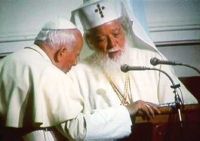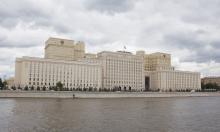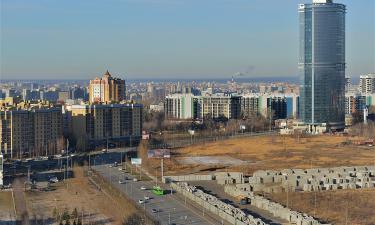Romania's Patriarch Teoctist dies of heart attack after surgery at the age of 92
Patriarch Teoctist, the head of the Romanian Orthodox Church, died of heart attack at the age of 92. It followed the surgery on his prostate gland, doctors at the Fundeni hospital told Realitatea TV Monday. Patriarch was famous for inviting the late John Paul II to Romania in 1999 and was considered to be too close to former Communists.

Teoctist was appointed to head the church in November 1986, but briefly stepped down after anti-communist protesters in 1989 said he had been too conciliatory toward former dictator Nicolae Ceausescu. He had refused to condemn Ceausescu's destruction of Orthodox churches in Bucharest. He was reinstated a few weeks later.
Although he was often criticized for failing to take a stand on thorny issues such as the rights of the Eastern Rite Catholic Church in Romania, the patriarch won praise when in 1999, the late Pope John Paul II visited Romania at Teoctist's invitation - the first extended by an Orthodox Church leader to a Catholic pope since the churches split in the Great Schism of 1054. The two leaders called for the healing of divisions within Christianity.
He won the respect of Romanians after he confessed that he had felt abandoned by God for years - from the time when he briefly resigned as patriarch until the pope's visit.
Teoctist was also criticized for being opposed to investigating the past of cleric who were believed to have collaborated with the Communist Securitate secret police. When communism ended, there was no purge within the church and no acknowledgment of the extent of clerics' collaboration.
In 2001, Securitate files discovered by a historian said that Teoctist had supported the fascist Legionnaire movement and was one of several priests who in 1941 helped ransack a synagogue in Bucharest during a Legionnaire uprising against the government. The church called the information in the files "a simple fabrication."
Born into a poor family in northeastern Romania in 1915, Teoctist was the tenth of 11 children. He became a monk when he was 20.
Earlier this month Teoctist condemned a Vatican document in which Pope Benedict XVI reasserted the primacy of the Roman Catholic Church, describing it as "brutal" and saying it made inter-church dialogue difficult.
"Teoctist ....had an efficient Byzantine manner that served the church," said Orthodox commentator Dan Ciachir. "He served the politics of the church. Nobody tricked him, not (former President Ion) Iliescu, nobody. He was good at understanding the little soul, the mediocre person," he told the Associated Press.
While Ceausescu discouraged church going and open displays of faith, political leaders have sought to associate with the church and benefit from its popularity since communism ended.
Subscribe to Pravda.Ru Telegram channel, Facebook, RSS!



